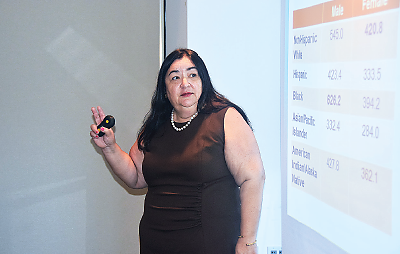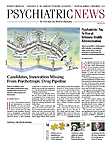As the United States becomes more ethnically diverse, there is a call for physicians and health care professionals to develop greater cultural competency so they can provide more effective care to patients of different ethnic backgrounds. Prominent among these are people of Hispanic descent, the fastest growing minority population in the country.
“Currently, 1 in 6 [56 million] people in the U.S. is Hispanic,” said President and CEO of the National Alliance for Hispanic Health (NAHH) Jane Delgado, Ph.D., M.S., who was the guest speaker at a program in September sponsored by APA’s Diversity at Work project. “This number is just 2 million people less than the population of both Australia and Canada combined.” Her presentation was held in observance of National Hispanic Heritage Month, which falls from September 15 to October 15.
Delgado, a Cuban-born American, immigrated to the United States at age 2 with her parents and sister. She overcame difficulties with English in her youth to become one of the most respected figures in clinical psychology and health policy—serving as senior policy advisor in the Immediate Office of the Secretary of Health and Human Services, which coordinates the secretary’s policies and includes health care reform initiatives, and a member of the National Advisory Council for the Carter Center Mental Health Task Force founded by Former First Lady Rosalynn Carter. Delgado, the first woman to serve as president and CEO of NAHH, has dedicated her career to improving the health of Hispanic and Latino Americans.
“Mental health involves more than the brain,” Delgado noted. “We really need to understand the people who we serve … and listen to them.” During an interview with Psychiatric News, she said a crucial factor that keeps Hispanic Americans from accessing mental health care, as well as other health care, is the fear of not being understood due to language barriers and the lack of cultural competence by clinicians who may not fully understand the symptoms that these patients are describing.
Delgado described one situation in which a person of Hispanic descent visited the emergency department and repeatedly said “dȳbil” when asked to describe his symptoms. Under the assumption that the patient was trying to convey that he was seeing the devil, the medical staff concluded that the patient’s illness was related to mental illness. “‘Dȳbil’ means ‘weak’ in Spanish,” Delgado explained. “This is but one of many examples of how misunderstandings” of patients’ ethnic background and language can affect the health care they receive.
Other obstacles that keep Hispanic Americans from accessing mental health services include lack of insurance and stigma. “We, as a country, are still working on decreasing stigma,” said Delgado. “People still think that the issue of mental health is something that you should get over and is a sign of weakness. We have to recast this way of thinking, not just for Hispanics but for everyone.”
Delgado, who advocates for minority health issues on Capitol Hill, also stressed the importance of increasing the diversity of subjects participating in clinical trials, particularly involving psychiatric drugs.
“Hispanics metabolize fat differently from the general population, making certain medications intended for diabetes more effective in this population, for example. Certain heart medications are more effective in African Americans,” she said. “Does this [concept] hold true for psychiatric medication that we give patients? We need to know.”
She added that “mental health professionals must push for better and more diverse data to make the best decisions for our patients.” ■

